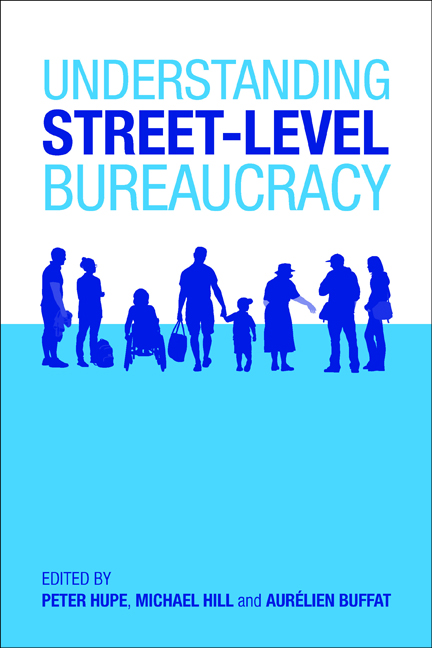Book contents
- Frontmatter
- Contents
- Biographical notes
- Preface
- Part One Introduction
- Part Two Delivering services and benefits: street-level bureaucracy and the welfare state
- Part Three Agents of the state: street-level bureaucracy and law enforcement
- Part Four Embedded in society: street-level bureaucrats as public actors
- Part Five The management of street-level bureaucrats
- Part Six The promise of professionalism
- Part Seven Conclusion
- References
- Index
Thirteen - First-line supervisors as gate-keepers: rule processing by head teachers
Published online by Cambridge University Press: 08 March 2022
- Frontmatter
- Contents
- Biographical notes
- Preface
- Part One Introduction
- Part Two Delivering services and benefits: street-level bureaucracy and the welfare state
- Part Three Agents of the state: street-level bureaucracy and law enforcement
- Part Four Embedded in society: street-level bureaucrats as public actors
- Part Five The management of street-level bureaucrats
- Part Six The promise of professionalism
- Part Seven Conclusion
- References
- Index
Summary
Introduction
First-line supervisors are, literally, positioned in the middle. Working in the hierarchy of ‘vertical public administration’, they are, on the one hand, truly managers, aiming to control the work of their subordinates. On the other, they are doing their job close to the work floor, more or less immediately receiving signals from there. It is in this pivotal position ‘in-between’ that first-line supervisors fulfil a crucial role. In public service, they co-determine the effectiveness of public policies while contributing to the outcomes of policy processes. In fact, they are policy co-makers in their own right.
The focus in this chapter is on the ways in which head teachers of primary schools process rules. While functioning as ‘school managers’, these school principals are daily receiving rules to comply with. These rules stem from a variety of sources: applicable rules are made by the Ministry of Education, local government, the school board and other institutional actors. At the same time, these head teachers are supervisors: the received rules have a particular applicability to the teachers working at their school. As street-level bureaucrats, the latter are supposed to ‘implement’ the rules. Therefore, it matters how head teachers react when confronted with new rules coming from relevant stakeholders, especially those at the top of a formal hierarchy. As managers working in the ‘first line’, head teachers can process those rules by just passing them downward, by formulating additional rules in order to specify the received ones or by buffering them. Therefore, if variation in the processing of rules can be observed, the question is which factors influence that rule processing.
This chapter reports on qualitative research into these matters undertaken in a city in The Netherlands. For reasons of anonymity, the city has been given the fictitious name of ‘Gluton’. The empirical data were gathered as part of the work of a master's thesis of one of the authors. The objective of the study was to contribute to the knowledge about the ways in which head teachers as first-line supervisors are doing their work – the latter being a relatively under-studied subject matter in the study of public administration and public management. The level of scientific ambition concerns that of a systematic description combined with an identification of relevant factors as qualitative steps towards a causal explanation.
- Type
- Chapter
- Information
- Understanding Street-Level Bureaucracy , pp. 227 - 242Publisher: Bristol University PressPrint publication year: 2015



